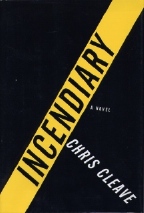Incendiary
Alfred A. Knopf / Random House
US Hardcover First Edition
ISBN 0-307-26282-0
Publication Date: 08-02-2005
244 Pages; $22.95
Date Reviewed: 09-08-05
Reviewed by: Rick Kleffel © 2005

REFERENCES
COLUMNS
|
|
|
IncendiaryAlfred A. Knopf / Random HouseUS Hardcover First EditionISBN 0-307-26282-0Publication Date: 08-02-2005244 Pages; $22.95Date Reviewed: 09-08-05Reviewed by: Rick Kleffel © 2005 |
 |
|
REFERENCES |
COLUMNS |
Chris Cleave likes to listen, and he listens well. 'Incendiary', his debut novel, is powered by the voice of his protagonist, a struggling middle-class London woman incensed by the death of her husband and son in a terrorist bombing. The novel runs on a nice conceit. It's a series of letters from our unnamed heroine to Osama Bin Laden in the wake of her loss. But what makes 'Incendiary' so compelling is the voice of the novel's narrator. Cleave is wired in to her skull, to her shtick, to the face she presents to the world and the face she sees in the mirror. He reveals her essence in language that is direct, easy-to-read and utterly compelling. Her rhythms capture the reader from the first page. After that, plan on dancing all night.
Cleave clearly has a sharp ear and possibly a portable tape recorder. The middle-class mom who tells the story is, "a woman built upon the wreckage of myself." She combines compulsive habits with a cynical, self-lacerating outlook. She's relentlessly, appealingly honest and direct. Whether she's talking about the smell of chip grease, her uninhibited infidelity, her overwhelming love for her son and husband -- her "guys" -- or describing scenes of chaotic horror, her voice is compulsively enjoyable. Reading the book is a constant pleasure, due entirely to Cleave's smooth prose and his great ear.
Cleave's protagonist has an eye and ear for action, and once the terrorist incident takes place, he orchestrates a magnificent, terrifying spectacle. But what follows is more powerful, more horrifying. As the narrator plunges into grief, the reader is offered a stone-cold clear picture of a woman in bereavement. She's bereaved not just for herself, but also for her city, her nation. Cleave's portrayal of bereavement is both horrific and darkly humorous. His narrator's grief is all encompassing and it seeps outward into her visions of the city. At first she knows she's hallucinating, but as the letters and the novel progress, she becomes less and less aware of her own state of mind. When people burst into flame or wave charred limbs in her face, she copes with a dark and very entertaining sense of humor. Cleave clearly understands the clinical aspects of grief and bereavement. He's able to translate them into the subjective experience of his narrator, in passages that are alternately harrowing and gorgeous. When the narrator sees her son walking down the centerline of her street, his hands extended as if to balance himself, flames extending from his fingers, the image is almost angelic. There's a fragile beauty to her slowly encroaching madness.
Though Cleave leads with a strong inner voice, he's quite adept at describing vast scenes of cosmopolitan chaos. He's able to pull back the camera and easily describe the horrors of the crowd with cinematic precision. But his post-bombing London is not simply a milling crowd of shell-shocked victims. He weaves together World War Two conspiracy theories to help justify a surreal response to the soccer stadium bombings, a series of moored dirigibles that the government describes as the "Shield of Hope." As our narrator finds herself employed by the Home Security service and embroiled in a love triangle with two upper-class reporters, she's plunged into a set of events where even her hallucinations have a hard time keeping up.
Obviously, 'Incendiary' is a novel about terrorism, and Cleave's dissection of terrorism is unsparing and complex. After the tragedy, the narrator lands a job with the newly beefed-up homeland security service. Cleave's view of the men an women who work there is as crystal-clear as his picture of bereavement. Once on the inside, the narrator becomes part of the machine, but she's not a happy cog. Her relationships with the man she works for and the two journalists she falls in with quickly complicate both her life and the lives of everyone around her. They’re all drawn to her stoic, relentlessly self-critical personality. And they're all involved in the government's less-than-honest response to the attack.
As this plays out in the plot of the novel, Cleave cranks up the tension. Between the surreal and visionary aspects of the narrator's perceptions and the conspiracies-come-to-life, 'Incendiary' takes on a bit of the feel of the best genre fiction, both science fiction and horror. Readers who enjoy the more literary examples of both will find lots to enjoy in Cleave's novel, which is, after all, a dystopian vision.
Cleave's smart to work the dystopian and conspiracy theory aspects into the plot, because though the voice remains strong, 'Incendiary' is not a perfect novel. Even while they enjoy the narrator's storytelling, readers will start to wonder how the story will play out. It's to Cleave's credit that he realizes this and manages a satisfying denouement.
'Incendiary' is nothing less than a stellar debut by a writer of vision humor and in the end, generosity. None of Cleave's characters are perfect. Everyone is flawed, actually unlikable in some way. But it's clear that Cleave loves all his characters, not in spite of their flaws, but because of their flaws. The conflicts that loom large here all grow out of the battles the characters must fight with their own flawed natures. Yes, we are at war. But the enemies are those traits that lead us to betray ourselves and one another. With 'Incendiary', Chris Cleave captures the complexities of a society at war with itself.